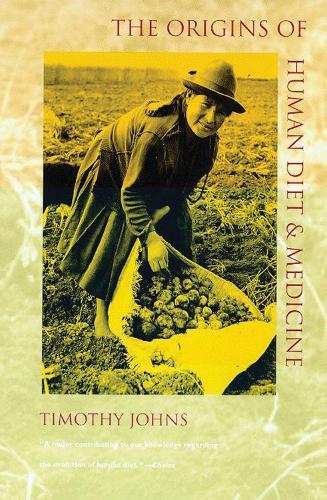Overview
People have always been attracted to foods rich in calories, fat, and protein; yet the biblical admonition that meat be eaten """"with bitter herbs"""" suggests that unpalatable plants play an important role in our diet. So-called primitive peoples show a surprisingly sophisticated understanding of how their bodies interact with plant chemicals, which may allow us to rediscover the origins of diet by retracing the paths of biology and culture. The domestication of the potato serves as the focus of Timothy Johns's interdisciplinary study, which forges a bold synthesis of ethnobotany and chemical ecology. The Aymara of highland Bolivia have long used varieties of potato containing potentially toxic levels of glycoalkaloids, and Johns proposes that such plants can be eaten without harm owing to human genetic modification and cultural manipulation. Drawing on additional fieldwork in Africa, he considers the evolution of the human use of plants, the ways in which humans obtain foods from among the myriad poisonous and unpalatable plants in the environment, and the consequences of this history for understanding the basis of the human diet. A natural corollary to his investigation is the origin of medicine, since the properties of plants that make them unpalatable and toxic are the same properties that make them useful pharmacologically. As our species has adapted to the use of plants, plants have become an essential part of our internal ecology. Recovering the ancient wisdom regarding our interaction with the environment preserves a fundamental part of our human heritage.
Full Product Details
Author: Timothy Johns
Publisher: University of Arizona Press
Imprint: University of Arizona Press
Dimensions:
Width: 15.40cm
, Height: 2.20cm
, Length: 23.00cm
Weight: 0.600kg
ISBN: 9780816516872
ISBN 10: 0816516871
Pages: 356
Publication Date: 01 September 1996
Audience:
College/higher education
,
Postgraduate, Research & Scholarly
Format: Paperback
Publisher's Status: Active
Availability: Awaiting stock

The supplier is currently out of stock of this item. It will be ordered for you and placed on backorder. Once it does come back in stock, we will ship it out for you.
Reviews
A major contribution to our knowledge regarding the evolution of human diet. -- Choice The perspective is fresh and insightful. . . . Johns has turned over new ground and, in doing so, he has challenged us to think more longitudinally and creatively about the dietary choices we have made (and continue to make) as a species and their biological and sociocultural consequences. -- American Anthropologist Advances the state of ethnobiological thinking on the role of biochemistry in human-plant interactions. . . . A landmark book, and one that should encourage us all to look more carefully at nutritional chemistry and more broadly and deeply at the human condition. -- Journal of Ethnobiology It is a pleasure to read an interdisciplinary work that is solidly scientific yet flexible enough to brave new ground. -- New Scientist
Author Information
Timothy Johns was appointed assistant professor of human nutrition at McGill University in 1987. He received his PhD from the University of Michigan, with his doctoral dissertation receiving the Distinguished Dissertation Award of 1985 from the Council of Graduate Studies in the United States/University Microfilms International.




